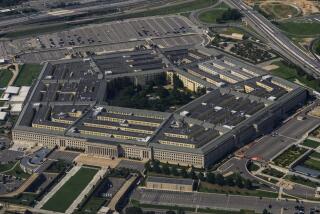Law on Independent Counsel Grew Out of Watergate
- Share via
WASHINGTON — In asking a special three-judge panel to name an independent counsel, Atty. Gen. Edwin Meese III will be acting under a law that is designed to avoid conflict of interest in the investigation of high-ranking Administration officials who are suspected of violating federal criminal law.
The law setting up the apparatus for an independent counsel, formerly known as a special prosecutor, is the Ethics in Government Act of 1978, which grew out of the Watergate scandal.
The possibility that illegal acts were committed in funneling to Nicaraguan contras funds from the sales of arms to Iran is “the type of case the Congress had in mind when they enacted the law,” Meese said Tuesday.
If the Justice Department were to pursue the investigation, a conflict of interest could result, Meese said, because “either I conceivably could have information where I might be a witness to certain facts that would be involved in the investigation, or other attorneys in the Department of Justice are in a similar situation.”
Under the law, Meese is required to conduct a preliminary investigation lasting up to 90 days when he receives information that any individual covered by the law has violated a federal criminal statute other than a petty offense.
Applies to Special Division
Those covered include the President and vice president, other high-ranking White House officials, the CIA director and assistant attorneys general, as well as others.
If the preliminary inquiry finds reasonable grounds for further investigation or prosecution, the attorney general applies to a special independent counsel division of the U.S. Court of Appeals here--a three-judge panel whose members are named by the chief justice.
The attorney general proposes a mandate for the independent counsel, but the court is free to expand or contract it. The judges then seek out and appoint the counsel, with no provision for the Justice Department to propose candidates.
The counsel selects his or her staff, and the FBI, at the counsel’s request, assigns agents to investigate and report directly to the counsel.
When the judges name a counsel--the seventh under the act--the action will mark the first time that three independent counsels have been operating at the same time. One is looking into conflict-of-interest charges against President Reagan’s former deputy chief of staff, Michael K. Deaver, while another is investigating whether former Assistant Atty. Gen. Theodore B. Olson gave false testimony to Congress about the Environmental Protection Agency.
Two other independent counsels have operated during the Reagan Administration, one investigating charges of financial improprieties against Meese and another looking into alleged organized crime links of former Labor Secretary Raymond J. Donovan.
More to Read
Get the L.A. Times Politics newsletter
Deeply reported insights into legislation, politics and policy from Sacramento, Washington and beyond. In your inbox twice per week.
You may occasionally receive promotional content from the Los Angeles Times.









